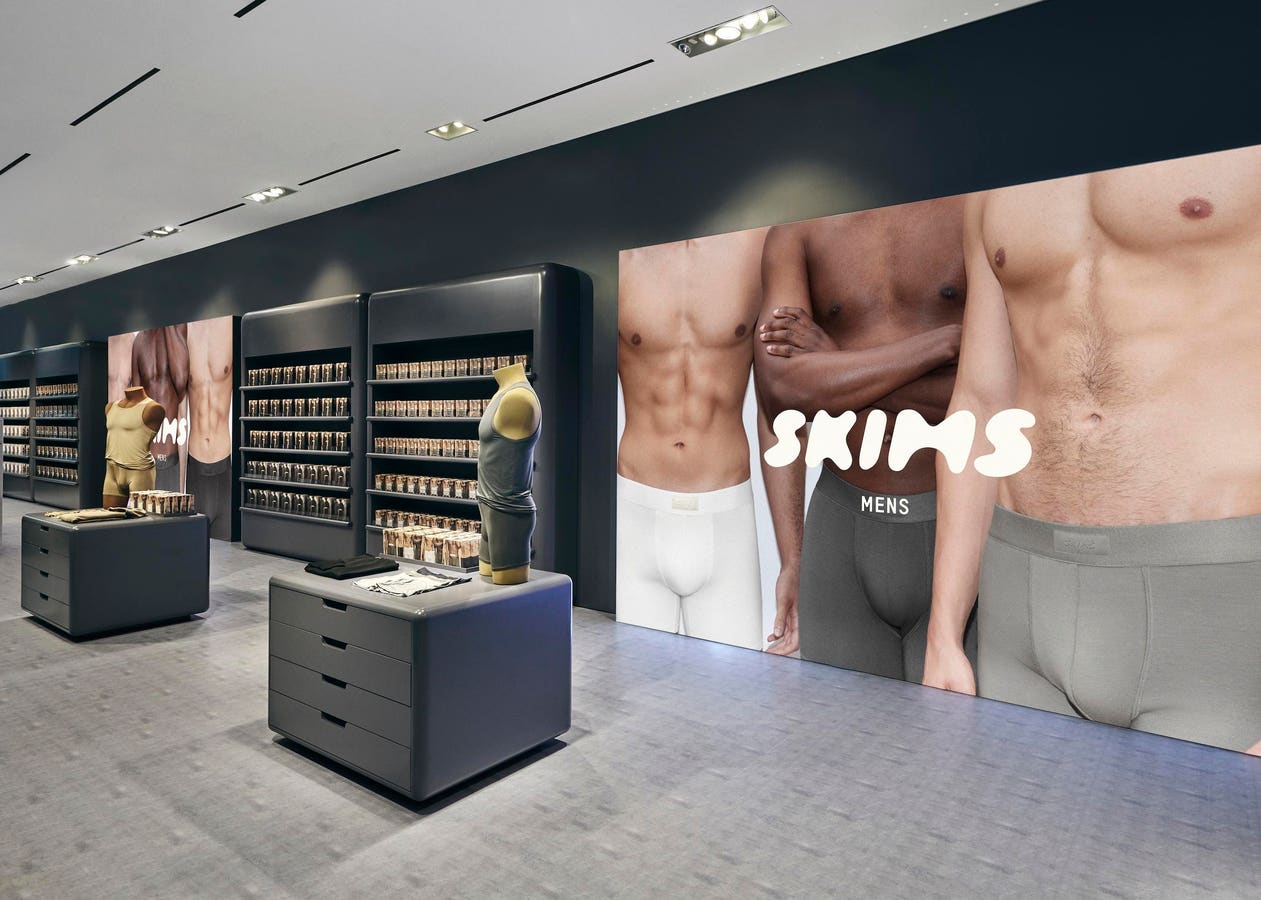Since its founding in 2019, Skims has made waves in the fashion industry with its innovative approach to shapewear, loungewear, and more recently, menswear. Co-founded by Kim Kardashian and Jens Grede, Skims has grown into a household name by offering inclusive and solution-driven products for all body types. Initially thriving as a direct-to-consumer (DTC) brand, it has since ventured into physical retail, first through a series of pop-ups and then with the opening of permanent stores. This bold expansion into the physical retail space—through standalone stores and wholesale partnerships—underscores the brand’s commitment to becoming a global leader in everyday essentials.
In the early days, Skims primarily operated as a DTC brand, using its e-commerce platform to reach millions of customers worldwide. Strategic marketing campaigns, celebrity endorsements, and a commitment to diversity and inclusivity in fashion drove rapid growth. However, as the brand matured, it became clear that physical retail would play a significant role in its future.
Robert Norton, Skims’ Chief Commercial Officer, emphasized the importance of expanding beyond the digital realm, stating, “We had a very large digital business, so when we rolled out physical, we didn’t have to be like everyone else, and we needed to show up in more of an experiential way versus traditional brick and mortar.”
Today, the brand launches its first men’s pop-up experience within Nordstrom, continuing to showcase its commitment to physical retail. The first-ever Skims Men’s pop-up at Nordstrom’s NYC flagship store will run through September 29th. It offers customers the chance to experience Skims Men’s game-changing underwear, loungewear, and essentials in person for the first time. But this is far from the brand’s first pop-up initiative.
Pop-Up Strategy
Skims’ initial foray into physical retail began with pop-ups designed to engage customers in high-traffic locations. From Los Angeles’ The Grove to Miami’s Design District and New York’s Rockefeller, these temporary installations allowed the brand to test its physical retail model and better understand consumer behavior in a tactile environment.
“Those were more for testing,” stated Norton, “How does the customer show up and engage with the brand? What are they again looking for? How do they interact with the product? All of that together informed our round one of real estate and permanent store openings.”
These pop-ups were a marketing tool and an opportunity to learn. Beyond the collected behavioral data, the brand gathered quantifiable data to help guide site selection and merchandising. Ultimately, the brand sees a significant opportunity in physical retail, emphasizing that most consumers still purchase its product categories in person. In 2022, the estimate was that over 54% of lingerie sales still happened offline, increasing to around 80% when looking across all retail sales.
Wholesale Partnerships And Nordstrom Pop-Up
In parallel to its standalone pop-ups, Skims also leaned heavily on wholesale partnerships, notably with Nordstrom, which has played an instrumental role in the brand’s retail strategy. Since partnering with Nordstrom in February 2020, Skims has benefited from a synergistic relationship emphasizing representation and innovation.
The partnership led to a women’s pop-up earlier this year and now a men’s pop-up.
“Our Skims Men’s partnership at The Corner in NYC immerses customers into an exclusive retail experience that brings the world of Skims Men’s to Nordstrom, featuring underwear and loungewear,” said Olivia Kim, Senior Vice President of Creative Merchandising at Nordstrom. “The space was co-designed with the Skims team and is rooted in their now well-known monochromatic tones, this time, a graphite gray.”
This partnership is one of the brand’s many wholesale ventures. Skims is also sold at Saks Fifth Avenue, Bergdorf Goodman, David Jones, Selfridges, Holt Renfrew, and other notable retailers globally.
Brands like Good American, co-founded by Khloé Kardashian and Emma Grede, have taken a very similar strategy, focusing on vital wholesale partners like Nordstrom, followed by its own pop-ups and permanent retail locations over the past few years.
A Commitment to Brick-and-Mortar
After gaining valuable insights from pop-up experiments and wholesale partnerships, Skims decided to commit to permanent retail spaces. Earlier this year, the brand opened its first permanent store in Georgetown, marking a significant milestone in its retail journey.
The brand has since expanded its brick-and-mortar presence to two other key locations, including Aventura Mall in Miami and, most recently, a new permanent store in Austin’s Domain Northside. Stores at Houston Galleria and Lenox Square in Atlanta are also in the pipeline, in addition to flagship stores in New York and Los Angeles.
“This first group [of stores] is, again, to learn the nuances between each location type: customer frequency, what they want to see, what the differences are in how they shop, what the category penetrations are, etc. We also want to understand our service model at a street-type location versus a high-traffic velocity mall,” stated Norton. So, although these stores are more permanent with longer leases, the brand is still learning and building its best retail model.
Looking ahead, Skims plans to continue balancing its direct-to-consumer model with wholesale partnerships and physical retail stores. The brand sees these channels not as separate entities but as interconnected opportunities to reach customers in new ways.
As Norton explains, “The interplay of the channels is extremely important. We almost don’t see them as different channels but as connected through one geographical distribution point.”
With plans to further expand its men’s collection, permanent U.S. stores, and international locations, Skims shows no signs of slowing down. As the brand continues to innovate in product design and retail strategy, it’s clear that Skims is not just a fashion brand—it’s a lifestyle brand built for the modern consumer.
Read the full article here





